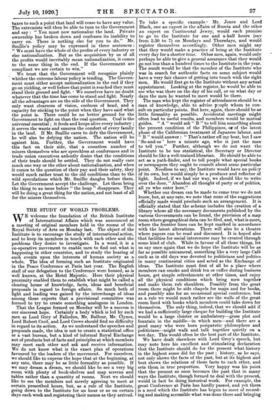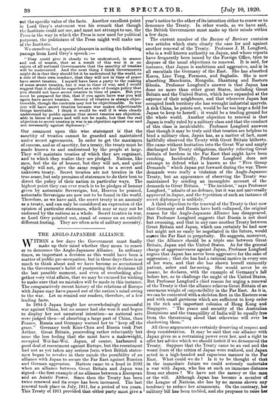THE STUDY OF WORLD PROBLEMS.
WE welcome the foundation of the British Institute of International Affairs which was announced at a meeting of original members held in the rooms of the Royal Society of Arts on Monday last. The object of the Institute is to encourage the study of international action, and to keep its members in touch with each other and the problems they desire to investigate. In a word, it is a co-operative movement to enable men to find out what is happening in other countries, and to study the bearing of such events upon the interests of human society as a whole. The idea of forming such an Institute originated in the Peace Conference at Paris last year. The English staff of our delegation to the Conference were housed, as is well known, at the Hotel Majestic. Here their physical proximity enabled them to establish what might be called a clearing house of knowledge, facts, ideas and beneficial proposals in regard to foreign aflairs. So much both of light and leading was gained by the interchange of ideas among these experts that a provisional committee was formed to try to create something analogous in London.
That the League formed on Monday will be a success is our sincerest hope. Certainly a body which is led by such men as Lord Grey of Fallodon, Mr. Balfour, Mr. Clynes, Lord Robert Cecil, and Lord Crewe should find no difficulty in regard to its action. As we understand the speeches and proposals made, the idea is not to create a statistical office or a vast bureau, but a kind of informal Royal Exchange not of products but of facts and principles at which members may meet each other and ask and receive information. We do not know what is the exact plan of operations favoured by the leaders of the movement. For ourselves, we should like to express the hope that at the beginning, at any rate, there may be as little formality as possible. If we may dream a dream, we should like to see a very big room with plenty of book-shelves and map screens and tables rather than a quantity of rooms. Next we should like to see the members not merely agreeing to meet at certain prescribed hours, but, as a rule of the Institute, going down to the Institute for an hour or so on certain days each week and registering their names as they arrived. To take a specific example • Mr. Jones and Lord Black, one an expert in the affairs of Russia and the other an expert on Continental Jewry, would each promise to go to the Institute for one and a-half hours (say from 5.30 to 7) on Mondays and Thursdays, and would register themselves accordingly. Other men might say that they would make a practice of being at the Institute every day for a shorter time. Other men, again, would only perhaps be able to give a general assurance that they would go not less than a hundred times to the Institute in the year. The result would be that the member of the Institute who was in search for authentic facts on some subject would have a very fair chance of getting into touch with the right men. He would first go to the Institute without any actual appointment. Looking at the register, he would be able to see who was there on the day of his call, or on what day or days the men he wanted to meet would be there.
The man who kept the register of attendances should be a man of knowledge, able to advise p3ople whom to con- sult on particular points. But here, again, there should be as little formality as possible. Accidental meetings might often lead to useful results, and members would be m,utual guides. " A " would ask" B " to tell him something about the present condition of the Philippines, or of the latest phase of the Californian treatm,ent of Japanese labour, and B "would answer : "That's rather off my beat, but I saw ' So-and-so ' here a minute ago, who is just the man to tell you." Further, although we do not want the Institute to be too statistical, the Secretary or Director should be like a well-trained librarian. He should be able to act as a path-finder, and to tell people what special books or newspapers they ought to consult about some particular point. Needless to say, the Institute would have no policy of its own, but would simply be a producer and reflector of light. Indeed, if we had our way, we should like to write over the door, "Abandon all thought of party or of politics, all ye who enter here."
Whether our dream can be made to come true we do not know, but, at any rate, we note that none of the suggestions officially made would preclude such an arrangement. It is officially stated that the scheme includes the creation of a library where all the necessary documents published by the various Governments can be found, the provision of a map room where geographical data can be filed, and, what is more, where the frontier lines can be kept marked in accordance with the latest alterations. There will also be a theatre where papers can be read and discussed. It is hoped also that facilities for social intercourse may be created through some kind of club. While in favour of all these things, let us say once again that we do hope the Institute will be as far as possible unicameral, something like a very large Cafe such as in old days was devoted to politicians and politics in many continental cities and acted as the Exchange of ideas. The Institute must first of all be a place where members can smoke and drink tea or coffee during business hours, get simple refreshments at other times, and enjoy all the physical conditions which bring men together and make them rub shoulders. Possibly from the great room there might be side chapels for maps and for books, and possibly also for an occasional special conference, but as a rule we would much rather see the walls of the great room lined with books which members could take down for themselves. The only thing, indeed, that we should add if we had a sufficiently large cheque for building the Institute would be a large cloister or ambulatory—grass plot and fountain in the middle—in which men—and there are a good many who were born peripatetic philosophers and politicians—might walk and talk together quietly on a wet day. This would often be the best part of the Institute. We have dealt elsewhere with Lord Grey's speech, but may note here his excellent and stimulating declaration that the Institute should do for the present what history in the highest sense did for the past ; history, as he says, not only shows the facts of the past, but at its highest and best shows the relations of these facts to each other, and sets them in true proportion. Very happy was his point that the present so soon becomes the past that in many ways the Institute, though formed to deal with the present, would in fact be doing historical work. For example, the great Conference at Paris has hardly passed, and yet there is a need which the Institute has begun to meet of record- ing and making accessible what was done there and bringing out the specific value of the facts. Another excellent point in Lord Grey's statement was his remark that though the Institute could not use, and must not attempt to use, the Press in the way in which the Press is now used for political purposes, the politicians of the Press might well make use of the Institute.
We ourselves feel a special pleasure in noting the following passage from Lord Grey's speech :— "They could give it clearly to be understood, in season and out of season, that as a. result of this war it is an axiom of all national Governments that the sanctity of treaties will be maintained. And the next thing I think Governments • might do is that they should let it be understood by the world, as a rule of their own conduct, that they will not in time of peace have secret treaties. I myself have been a party to the making of some secret treaties, but it was in time of war, and I would suggest that it should be regarded as a rule of foreign policy that you should not have secret treaties in time of peace. But you must be prepared for this, that if you again have war you will again have secret treaties. Secrecy of treaties is always objec- tionable, though the contents may not be objectionable. In war you will have secret treaties because war makes objectionable things inevitable. I think it would be well if it were clearly understood by public opinion that secret treaties are objection- ' able in times of peace and will not be made, but that the real objection to secret treaties in war is an. objection against war and not necessarily against diplomacy."
Our comment upon this wise statement is that the sanctity of treaties cannot be guarded and maintained under secret agreements. In order to get the maximum of success, and so of sanctity, for a treaty, the treaty must be made known to and understood by the people at large. They will maintain treaties of which they are cognisant, and to which they realize they are pledged. Nations, like men, feel the tie of honour, but they will not, and quite rightly will not, give the sarae respect to a secret and unknown treaty. Secret treaties are not treaties in the true sense, but only promises of statesmen to do their best to direct the policy of their nation in particular ways. The highest point they can ever reach is to be pledges of honour given by autocratic Sovereigns, but, Heaven be praised, autocratic Sovereigns are now not to be found in the world. Therefore, as we have said, the secret treaty is an anomaly as a treaty, and can only be considered an expression of the opinion of particular statesmen, which may or may not be endorsed by the nations as a whole. Secret treaties in war, as Lord Grey pointed out, stand of course on an entirely different footing. They are often acts of military necessity.



































 Previous page
Previous page